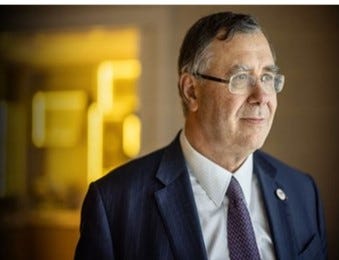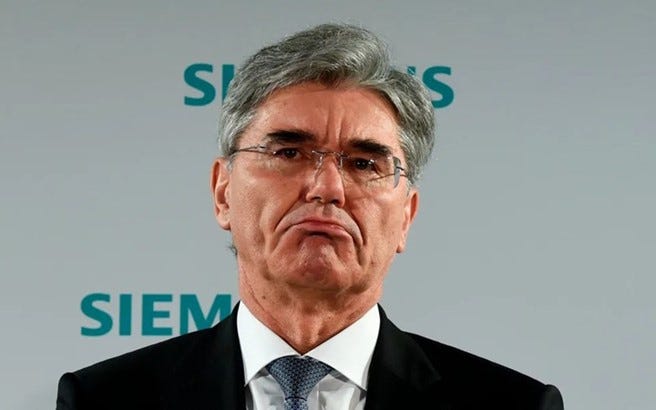Energy Musings - February 15, 2024
Patrick Pouyanne, CEO of TotalEnergies, told the FT that governments are misleading citizens about what the energy transition will cost them. He plans to capitalize on those high power prices.
Another Warning About The Cost Of Energy Transition
In a recent extended interview with the Financial Times, France’s TotalEnergies CEO Patrick Pouyanné outlined the company’s business strategy. It is to continue investing in new oil and gas projects to increase output while also outspending its European competitors on renewable energy projects. On the one hand, the strategy reflects the reality of future oil and gas demand. On the other hand, it responds to the pressure of climate change activists to shift to renewable energy faster. TotalEnergies’ business strategy has been consistent during the decade Pouyanné has run the company.
TotalEnergies CEO Patrick Pouyanne said governments are misleading their citizens about the cost of the energy transition.
In response to the activists, Pouyanné told the FT that governments are mis-selling the energy transition because they fail to warn their citizens that shifting to cleaner energy will result in higher energy bills. As that reality is starting to hit the public’s pocketbooks, they are rebelling. That was glaringly evident in the past few weeks with the continent’s farmers protesting the anti-agricultural and anti-fossil fuel rules demanded by the green energy agendas of the European Union and its various member governments. Almost no EU member country avoided farmer protests that disrupted the everyday lives of ordinary citizens. The pushback against green agendas has cost some politicians their jobs, while others facing upcoming elections feel threatened.
Siemens Energy CEO Joe Kaeser warned people about the high cost of the energy transition and why natural gas was cheaper.
Pouyanné crystalized the issue about the energy transition, much like Joe Kaeser, CEO of Siemens Energy did at the World Economic Forum last month. In 2023, TotalEnergies only spent one-third of its $16.8 billion in capital expenditures on the company’s “low-carbon” integrated power business. The climate activists pointed out that TotalEnergies’ low-carbon spending had plateaued while oil and gas spending increased. The wrong move. However, the low-carbon business is not yet profitable.
The reason Pouyanné wants to continue investing in “low carbon” projects is that he expects the energy transition to result in permanently higher electricity prices. What? Is this a profit opportunity? We are led to believe that renewable energy is cheaper than fossil fuels and getting cheaper. How can electricity bills go up and then stay up?
“I know that there is a theory which says renewables are cheaper, so it will be a lower price,” Pouyanné told the FT. “We don’t think so because a system where you [have] more renewable intermittency is less efficient . . . so, we think it’s an interesting field to invest in.”
Bingo! When you have a meaningful share of renewable energy power generation on a grid, the costs to deliver the power to customers along with sustaining fossil fuel generating plants to back up the renewable energy when the wind doesn’t blow and the sun doesn’t shine go up. That is why electricity costs are going up and will stay up. Additionally, carbon emissions will continue because they come from the backup fossil fuel plants that are needed.
Kaeser had warned similarly back in January. “I believe that for a while [customers] need to accept higher pricing.” That is not a popular or mainstream renewable energy message. However, it is the truth. The reason for it was explained by Kaeser. If renewable energy companies (suppliers of equipment such as Siemens Energy) can’t make a profit, they will never have sufficient money to innovate and develop cheaper and more efficient solutions that will eventually bring down renewable energy’s cost.
As Kaeser said, once the industry becomes profitable “…then there might be innovation – about the weight of the blades, other efficiency methods, technology – so the cost can then go down again. But the point is, if there is no profit pool in an industry, why should that industry innovate?” Pay me now and pay me later?
The most shocking message from Kaeser was this disarming statement. “If you want to have cheap energy, you need to be gas-fired. That’s the cheapest way, the most secure way if you calculate the whole thing, from the beginning to the end.” While Pouyanné didn’t make such a declaration, his company’s strategy is to continue investing in oil and gas projects because it believes global energy demand will continue rising for years, and some of that increase will be associated with increased renewable energy.
When you have the CEOs of two European energy companies firmly in the middle of the energy transition warning about misinformation about the cost of the energy transition for consumers, one must pay attention.
While not a part of this story directly, we just learned that JP Morgan Asset Management and State Street Global Advisors, two of the five largest global asset managers, are exiting Climate Action 100+, an investor group set up to prod corporations over their climate change policies. The world’s largest money manager, BlackRock, is transferring its membership in the group to its European division, a small part of its overall business.
Climate Action 100+ was formed in 2017 and the three investment firms leaving joined in 2020. Neither Vanguard nor Fidelity Investments, the remaining asset managers in the global top five, ever joined the organization.
These moves signal that investors recognize that being a climate activist in the financial world may be a liability. Several of these firms have been criticized over their shareholder votes on climate change motions at company annual meetings. Additionally, many of those firms have battled state government agencies overseeing their employees’ pension funds over their stance on climate change policies and anti-fossil fuel demands. The realities of the energy transition are slowing its pace as those destined to suffer from the transition’s higher prices rebel. The energy transition is not going smoothly and is destined to continue to face rough sledding.





